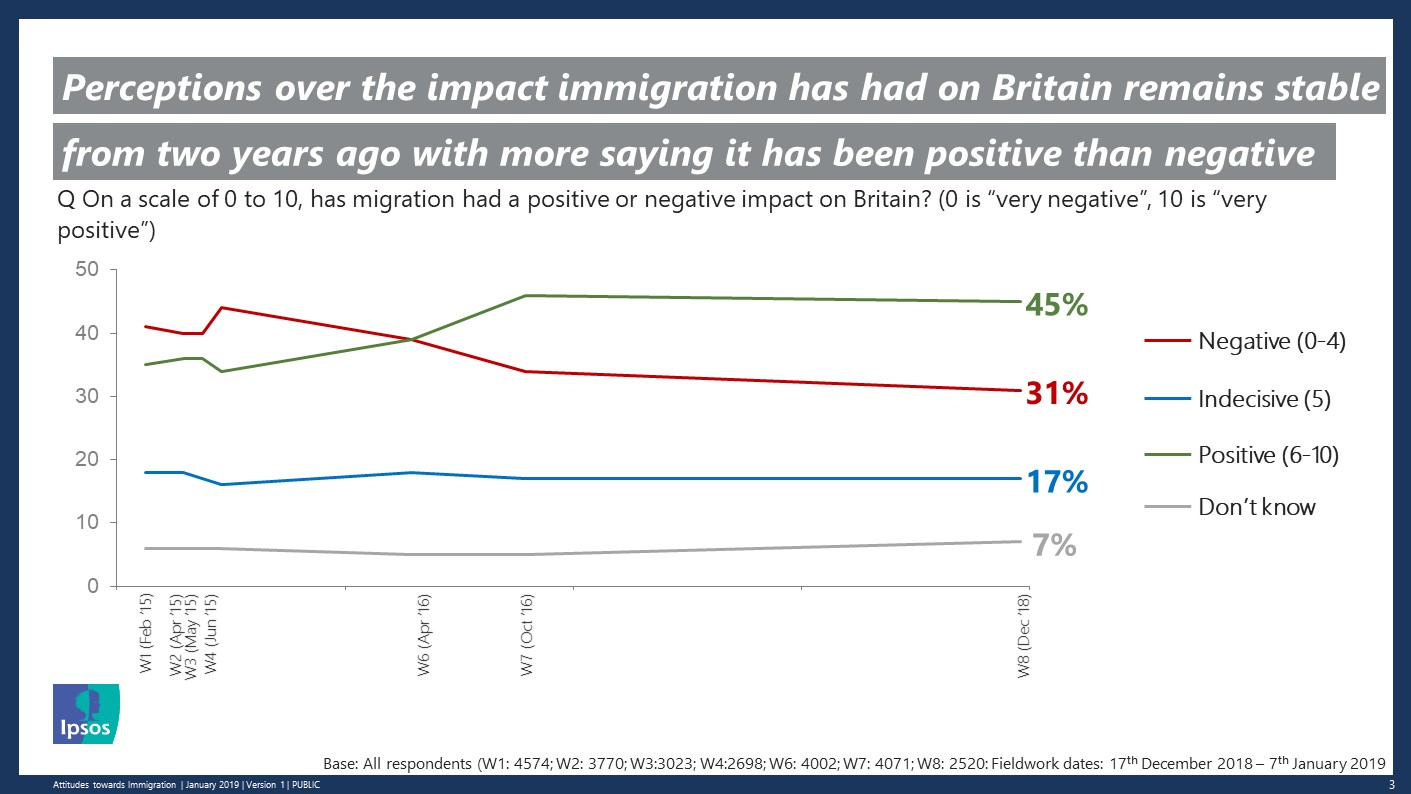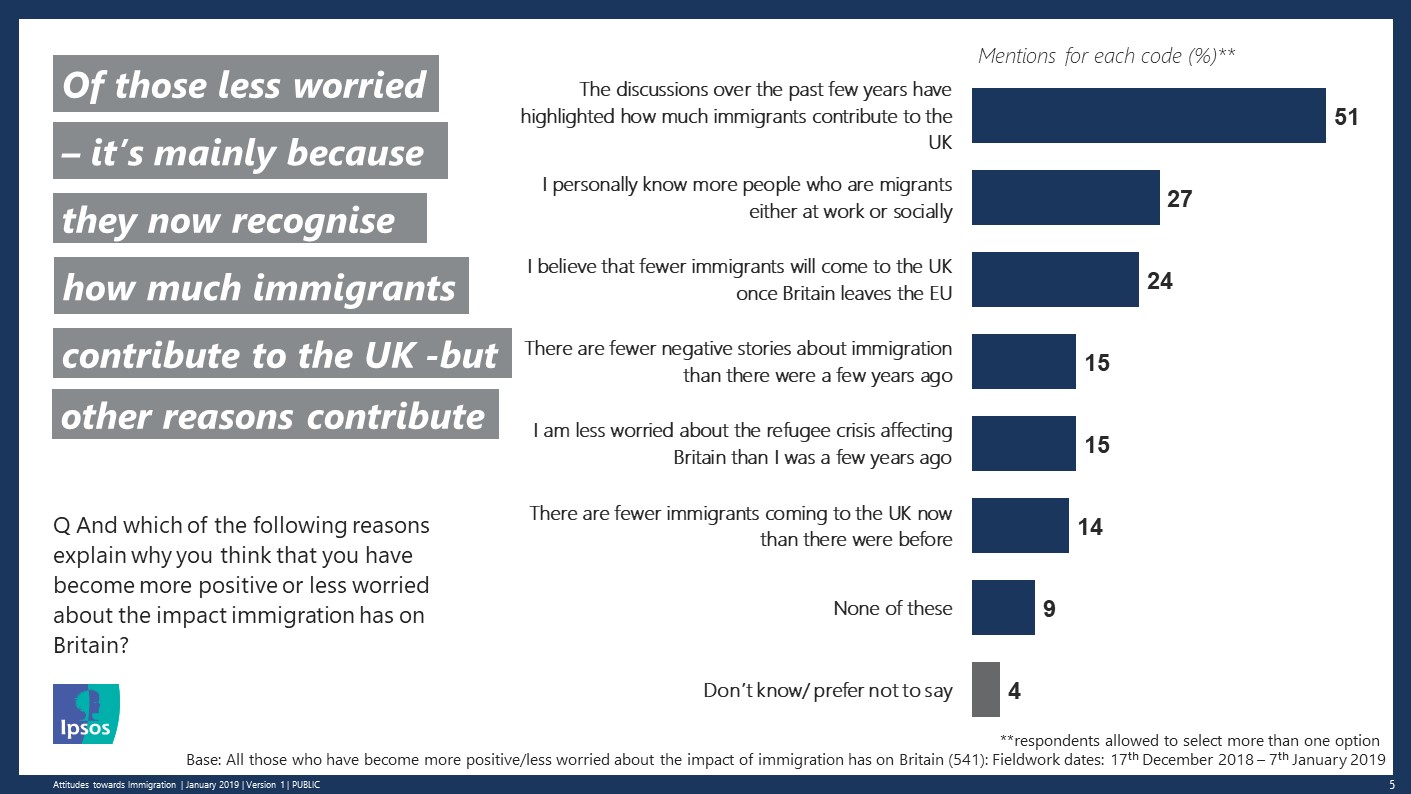Britons are more positive than negative about immigration’s impact on Britain
The online survey of c.2,500 British adults for IMiX is the latest in a unique longitudinal study which looks to track how individuals’ views on immigration and other values change over time. The latest survey finds that:
General attitudes towards immigration are more positive than negative
Just under half (45%) say they’re positive about immigration’s impact on Britain while three in ten (31%) say they are negative (down 3 points). This remains stable after the increase in more positive immigration attitudes seen just before and after the EU referendum and is in line with other recent Ipsos research.

Of those who say they’ve become more positive about immigration, half attribute it to there being more positive discussion about immigrants
- One in five (21%) say they have become more positive or less worried about the impact immigration has on Britain. When we asked those who have become more positive or less worried why this is, half (51%) say it’s because the discussions over the past few years have highlighted how much immigrants contribute to the UK while a quarter (27%) say they personally know more people who are migrants either at work or socially. On the other hand, 24% say it’s because they believe fewer immigrants will come to the UK once Britain leaves the EU, and 14% say it’s because there are fewer immigrants coming to the UK now.

There is not majority support for a reduction in the level of immigration of low-skilled or high-skilled EU workers, although the proportion of people who want to see immigration reduced remains stable at six in ten. There is support for a similar or increased levels of immigration for certain types of EU workers, particularly in healthcare
- When asked about specific occupations, only a minority of Britons want to see higher-skilled worker numbers from the EU reduced (13%) while more either want the numbers to stay the same (47%) or increased (31%).
- When it comes to lower-skilled workers from the EU, the public are more split– 42% want their numbers reduced while a similar proportion want them to remain the same (40%) and one in ten (9%) want them to be increased.
- The proportion of those who want to see immigration reduced also remains stable at around three in five (58%).
- The majority (57%) of Britons remain dissatisfied with how the government is dealing with immigration (just 11% are satisfied) which is down from 62% in April 2016.
Fewer people now believe immigrants take jobs away from Britons but views remain more negative on the impact of immigration on some services
- Fewer agree now than in 2016 that immigrants take jobs away from real Britons (30% - down 5 points) as well as fewer agreeing that immigrants take important welfare services away from real Britons (42% - down 5 points)
- While close to half (47%) think immigration enriches the UK (24% disagree), two-thirds (68%), however, believe immigration puts pressure on public services and housing while 64% think immigrants too often don’t integrate and follow British customs.
- People are split on whether immigration improves people’s standard of living (29% agree vs. 33% who disagree) as well as saying they have no problems with the way Britain’s population is changing (33% agree they have no problems while 36% disagree).
Other findings from the study show:
People have become more pessimistic about their outlook on life compared with two years ago and are showing a greater sense of nostalgia
- Three in five (58%) say that for most people in Britain life is getting worse rather than better (up 9 points).
- A quarter (27%) say that they’re finding it much more difficult to get by on their household income (up 6 points) while less than a quarter (23%) think that they benefit from Britain’s economic growth (down 5 points).
- Half (49%) say they’re always optimistic about their future (down 4 points) while a quarter (23%) say they’re not (up 4 points).
- And nearly half (47%) say things in Britain were better in the past (up 5 points).
Kully Kaur-Ballagan, Research Director at Ipsos said
Brits continue to be positive on balance about the impact of immigration on the UK, a trend which we have observed elsewhere. The reasons people give for this appear to be a mix of those now being more aware of the positive benefits of immigration as well as those who they think that numbers are and will continue to reduce. The study also points to the fact that people’s views of migrants are changing – fewer people now think they are taking jobs and welfare services away from Britons. Yet, despite attitudes shifting in a more positive direction, there is still a sense that migration causes pressures on public services and the majority still favour reducing immigration levels – something which has not really changed much over time.
Alex Mitchelmore, Media Manager at IMiX, said:
British people are positive about immigration. We see how much people who migrate to the UK contribute and we like working and socialising together. For people who campaign for Britain’s immigration system to be reformed so it better reflects the open and welcoming country that we are, we should take confidence in that fact. First, because it shows we’re on the right side of public opinion. But also because, as the data now shows, it’s the discussions highlighting migrants’ contributions and the more positive media debate around the issue that have helped to bring the public to where they are now.
Technical Note
Ipsos interviewed a representative sample of 2,520 British online adults aged 18+ between 17 December 2018 – 7 January 2019. The is study is funded by Unbound Philanthropy and the Barrow Cadbury Trust. Interviews were conducted on Ipsos’ online panel and results have been weighted by demographic factors to represent the British population.



